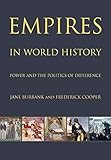Empires in World History : Power and the Politics of Difference / Frederick Cooper, Jane Burbank.
Material type: TextPublisher: Princeton, NJ : Princeton University Press, [2022]Copyright date: ©2011Description: 1 online resource (528 p.) : 44 halftones. 34 line illusContent type:
TextPublisher: Princeton, NJ : Princeton University Press, [2022]Copyright date: ©2011Description: 1 online resource (528 p.) : 44 halftones. 34 line illusContent type: - 9781400834709
- Colonias -- Historia
- Colonies -- History
- Colonización -- Historia
- Colonization -- History
- Difference (Philosophy) -- Political aspects -- History
- Historia mundial
- Imperialism -- History
- Imperialismo -- Historia
- Política mundial
- Power (Social sciences) -- History
- World history
- World politics
- HISTORY / World
- Abbasid caliphate
- Abdulhamid II
- Abdullah ibn Husayn
- Aegean
- African National Congress
- Appalachian Mountains
- Aztec empire
- Balkanization
- Baltic Germans
- Bolshevik party
- Bosnia-Herzegovina
- British empire
- Buddhism
- Byzantine empire
- Caesar
- Caribbean
- Catholic monarchy
- Caucasus
- Chagatai khanate
- Charlemagne
- Chinese empires
- Christian Social Party
- Dagestan
- Daniilovichi
- Donglin Society
- Dutch empire
- Edict of Toleration
- Empire of Liberty
- Enlightenment
- Etruscans
- Faisal ibn Husayn
- Gandhi, Mohandas
- Geneva conventions
- Gujaratis
- Hadramaut
- Hinduism
- absolutist monarchy
- affirmative action
- anticolonial movements
- antislavery movements
- barbarians
- caciques
- capital punishment
- censorship
- civilizing missions
- colonial empires
- constitutions
- corporal punishment
- creoles
- decolonization
- disease
- eunuchs
- free trade
- D32
- online - DeGruyter
| Item type | Current library | Call number | URL | Status | Notes | Barcode | |
|---|---|---|---|---|---|---|---|
 eBook
eBook
|
Biblioteca "Angelicum" Pont. Univ. S.Tommaso d'Aquino Nuvola online | online - DeGruyter (Browse shelf(Opens below)) | Online access | Not for loan (Accesso limitato) | Accesso per gli utenti autorizzati / Access for authorized users | (dgr)9781400834709 |
Browsing Biblioteca "Angelicum" Pont. Univ. S.Tommaso d'Aquino shelves, Shelving location: Nuvola online Close shelf browser (Hides shelf browser)

|

|

|

|

|

|

|
||
| online - DeGruyter New Faces, New Voices : The Hispanic Electorate in America / | online - DeGruyter Who Cares? : Public Ambivalence and Government Activism from the New Deal to the Second Gilded Age / | online - DeGruyter Early Modern Jewry : A New Cultural History / | online - DeGruyter Empires in World History : Power and the Politics of Difference / | online - DeGruyter A Certain Ambiguity : A Mathematical Novel / | online - DeGruyter The Company of Strangers : A Natural History of Economic Life - Revised Edition / | online - DeGruyter Economic Gangsters : Corruption, Violence, and the Poverty of Nations / |
Frontmatter -- CONTENTS -- LIST OF ILLUSTRATIONS -- PREFACE -- 1 Imperial Trajectories -- 2 Imperial Rule in Rome and China -- 3 After Rome: Empire, Christianity, and Islam -- 4 Eurasian Connections: The Mongol Empires -- 5 Beyond the Mediterranean: Ottoman and Spanish Empires -- 6 Oceanic Economies and Colonial Societies: Europe, Asia, and the Americas -- 7 Beyond the Steppe: Empire-Building in Russia and China -- 8 Empire, Nation, and Citizenship in a Revolutionary Age -- 9 Empires across Continents: The United States and Russ -- 10 Imperial Repertoires and Myths of Modern Colonialism -- 11 Sovereignty and Empire: Nineteenth-Century Europe and Its Near Abroad -- 12 War and Revolution in a World of Empires: 1914 to 1945 -- 13 End of Empire? -- 14 Empires, States, and Political Imagination -- Suggested Reading and Citations -- Index
restricted access online access with authorization star
http://purl.org/coar/access_right/c_16ec
How empires have used diversity to shape the world order for more than two millenniaEmpires—vast states of territories and peoples united by force and ambition—have dominated the political landscape for more than two millennia. Empires in World History departs from conventional European and nation-centered perspectives to take a remarkable look at how empires relied on diversity to shape the global order. Beginning with ancient Rome and China and continuing across Asia, Europe, the Americas, and Africa, Jane Burbank and Frederick Cooper examine empires' conquests, rivalries, and strategies of domination—with an emphasis on how empires accommodated, created, and manipulated differences among populations.Burbank and Cooper examine Rome and China from the third century BCE, empires that sustained state power for centuries. They delve into the militant monotheism of Byzantium, the Islamic Caliphates, and the short-lived Carolingians, as well as the pragmatically tolerant rule of the Mongols and Ottomans, who combined religious protection with the politics of loyalty. Burbank and Cooper discuss the influence of empire on capitalism and popular sovereignty, the limitations and instability of Europe's colonial projects, Russia's repertoire of exploitation and differentiation, as well as the "empire of liberty"—devised by American revolutionaries and later extended across a continent and beyond.With its investigation into the relationship between diversity and imperial states, Empires in World History offers a fresh approach to understanding the impact of empires on the past and present.
Mode of access: Internet via World Wide Web.
In English.
Description based on online resource; title from PDF title page (publisher's Web site, viewed 29. Jul 2022)


